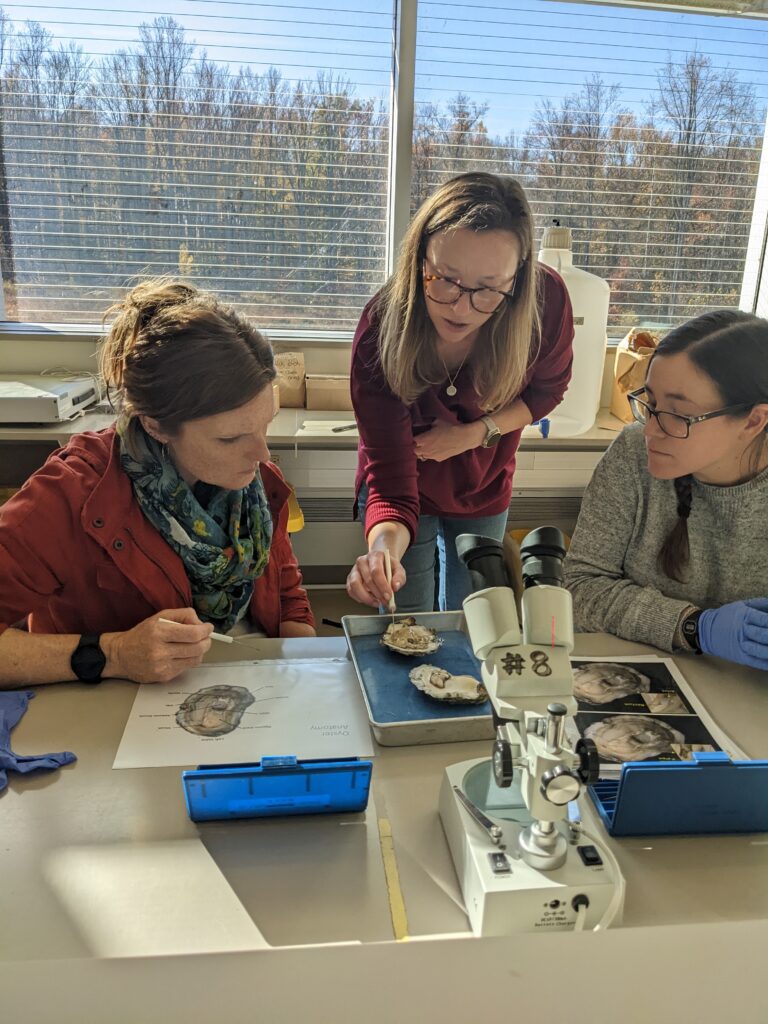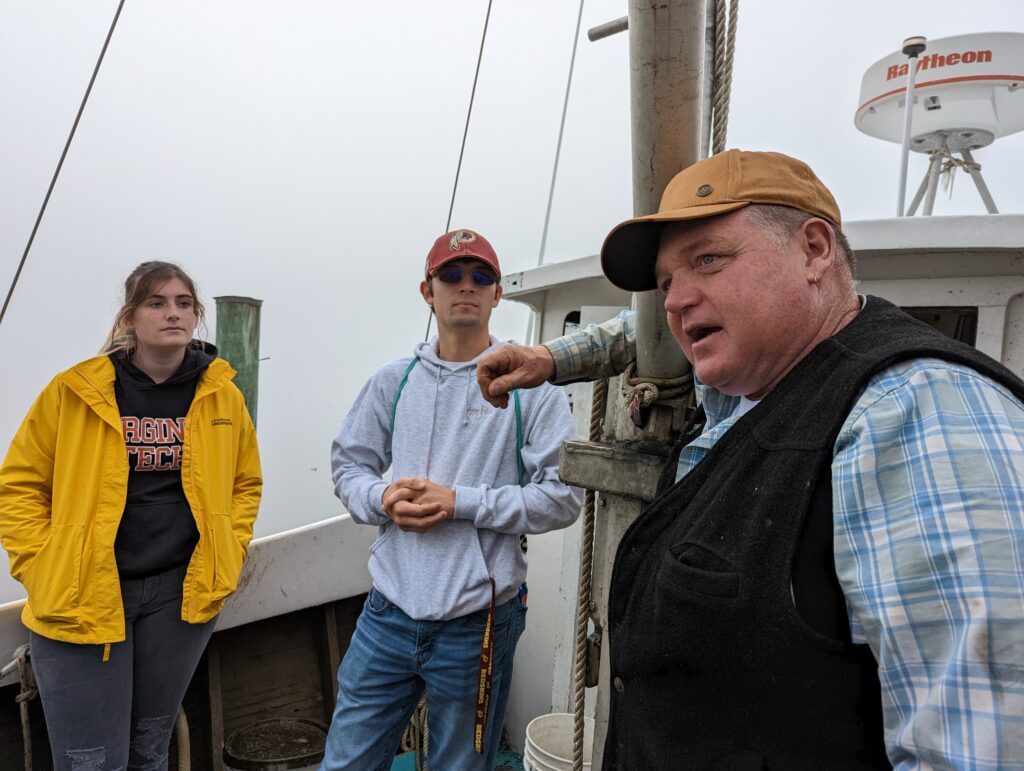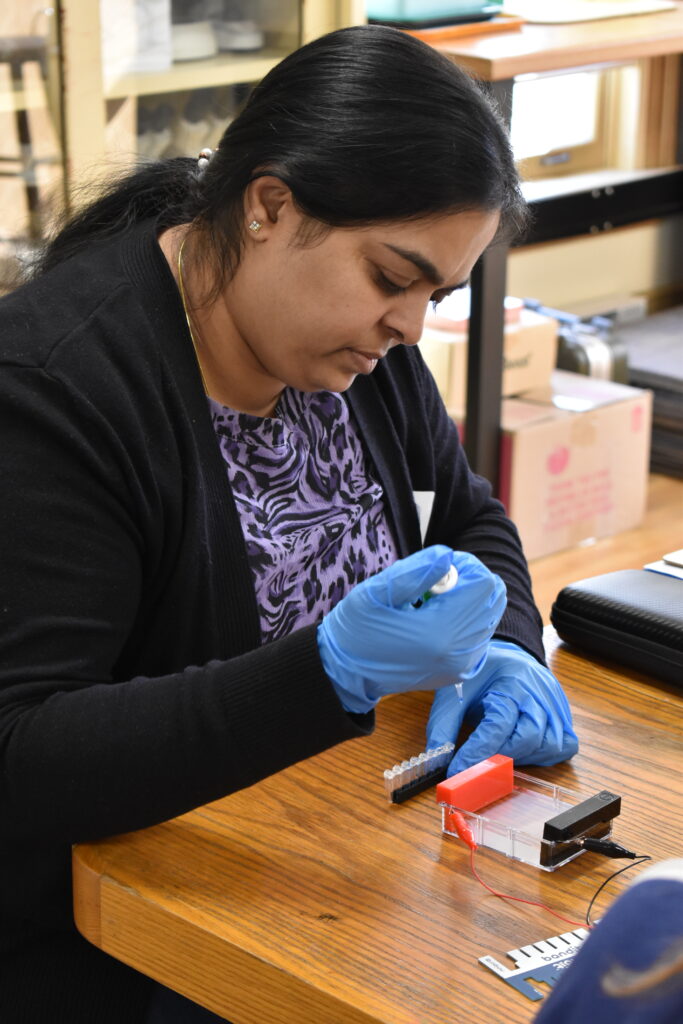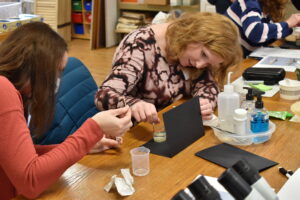by Anna Davis, education postdoc

It may have been a long time since you were a student. However, there are likely some educational experiences that have stuck with you long after you left formal education.
For me, I vividly remember learning about watersheds in elementary school. A group of environmental educators visited our class one morning to demonstrate how watersheds work. I watched as they added colorful ‘pollutants’ to rivers in a three-dimensional model of the Chesapeake Bay watershed. As we made it “rain” with spray bottles, the pollutants flowed toward the low-lying Bay where they combined into a brown liquid.
When I left the classroom, I was able to connect that the streams and rivers in the model were the same ones I spent my summers playing in. And I understood that local actions had larger consequences downstream. It was a critical moment that began my interest in environmental science.
This educational experience was memorable because it related to my “place”—an area with meaning.
Place can be something as small as your backyard or as large as the country you call home. More importantly, it tied to my sense of place: the meanings I assigned to my local area as a result of my experiences. For the Smithsonian Environmental Research Center’s (SERC) education programs, place and sense of place are increasingly being used to help educators increase student understanding of and appreciation for the environment.
A Need for Environmental Literacy
The Chesapeake Bay is an urbanized estuary that forms the backdrop for the research at SERC. More than 18 million people reside in the Chesapeake Bay watershed, putting a huge environmental strain on the Bay ecosystem. Runoff from urban centers and agricultural activities has introduced pollutants into the water. Commercial fishing has removed key species from the food web. Globalization has led to the introduction of non-native species to coastal waters and ecosystems. Development has led to the destruction of natural environments. And climate change impacts—such as sea level rise, rising temperatures, and increasing coastal storms—are intensifying the strain.

Combatting these environmental issues requires an educated and motivated public. And educating K-12 students is an important way to engage a new generation in environmental stewardship.
Environmental literacy—understandin the connections between people and the environment—is a key focus of K-12 science education. Environmental literacy is important because it supports the development of students’ critical thinking skills and motivates them to be stewards of their local environment.
Place-based education is one approach teachers are using to increase student environmental literacy. Place-based education uses local communities and environments as a context for learning about a range of subjects, including language arts, mathematics, social studies and, importantly, science. By immersing students in environments that are local and familiar, place-based education helps engage students in learning, leading to higher academic achievement. In addition, it can help to increase a student’s sense of place, increasing their engagement with their local community.
Place-Based Education at SERC

The Chesapeake Bay Environmental Literacy Educator Training (EnLET) program began in spring 2022 with gracious funding from the Merrill Foundation. The EnLET program sponsors professional development trainings for classroom and non-classroom educators who teach throughout the Chesapeake Bay region. The workshops focus on environmental issues facing the Chesapeake Bay related to SERC research. In keeping with the place-based education focus, the workshops highlight the many ways the issues relate to local ecology, economy and culture.
By focusing efforts on training educators, the EnLET program has significant reach. We estimate that each participating classroom educator has the potential to share material with nearly 100 students annually. Participating non-classroom educators have the potential to interact with far greater individuals through their programming, allowing for even greater reach. Non-classroom educators provide informal education programs, and can include educators at aquariums, environmental centers or museums. With approximately a dozen educators in each workshop, we have the potential to reach thousands of students throughout the program’s three years.
Workshops to date have focused primarily on oyster declines in Chesapeake Bay, and the ecological, economic and cultural implications. The workshops introduced educators to the issue, the science being conducted to address it, and some of the factors complicating its resolution. The educators engaged in hands-on activities, local field trips and interactions with oyster scientists and local stakeholders. Participating teachers received structured datasets and corresponding activities that they could bring back to their classroom. Participants will also be creating classroom-tested activities based on the material that will be shared broadly through SERC’s educational resources.
A key aspect of environmental literacy is helping students understand the process of science, and the methods scientists use to answer questions. To address this, EnLET also offers workshops that help educators bring some key science methods into their classroom.

The first “EnLET Skills” workshop in January 2023 focused on understanding how environmental scientists use genetic methods. Participating teachers got hands-on experience with DNA extraction using everyday materials. They also practiced gel electrophoresis—a genetic laboratory technique—to investigate diseases infecting Chesapeake Bay oysters and other bivalves.
Plans for 2023 and Beyond
Spring 2023 marks the beginning of the second year of the EnLET program at SERC, and we’re setting our sights on new topics relevant to SERC research.
Workshops this year will focus on the environmental and societal implications of invasive species in the Chesapeake, highlighting research in SERC’s Coastal Disease Ecology and Marine Invasions laboratories. Other workshops will bring educators to ecosystems on the edge, highlighting research on human impacts on wetlands from SERC’s Biogeochemistry and Global Change Ecology laboratories. We’ll also continue to sponsor workshops that help educators understand some of the methods SERC researchers use to answer important environmental questions.
As the program grows, so will our resources available for local educators. Our goal with the resources is to help educators throughout the region to create memorable, place-based educational experiences that will stick with their students long after they graduate. Ultimately, we hope to inspire the next generation to be environmentally literate stewards of the Chesapeake Bay.

